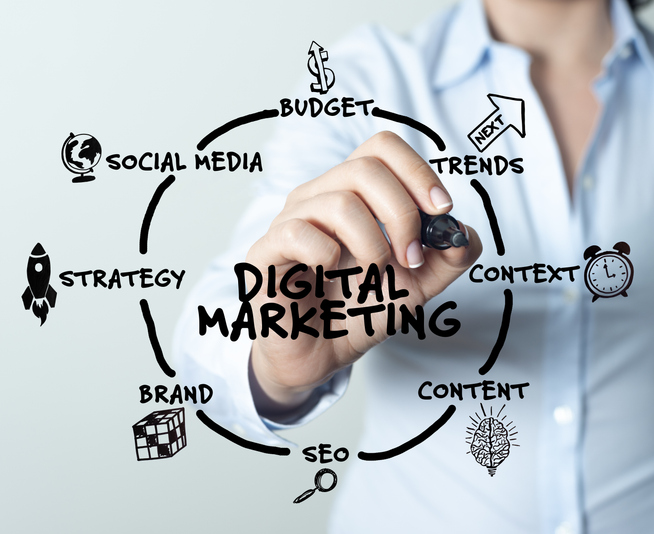
What works well for one company might not bring the same results for another.
That’s why it’s crucial to focus on platforms that match your goals and speak to your ideal audience. When you use the right tools, you reach more people, get better results, and grow your business without overspending.
In this article, you’ll learn how to pick the most effective marketing channels for your brand and use them to improve your return on investment. Read on for the details!
Key Takeaways
- Understanding your target audience is essential for selecting the most effective digital platforms.
- Choosing digital marketing platforms that align with your goals leads to smarter spending and better results.
- Data-driven and targeted advertising improves efficiency and boosts ROI.
- An optimized website ensures visitors convert into leads or loyal customers.
- Email marketing campaigns and SEO strategies support long-term growth through retention and organic traffic.
- Tracking performance and staying open to new platforms helps you adapt and stay competitive.
Know Your Target Audience First
Before investing in any digital platform, it’s critical to know who you’re trying to reach. This will help narrow down the platforms where they spend most of their time.
For instance, Gen Z tends to favor TikTok and Instagram, while professionals are more active on LinkedIn. Without this clarity, you risk wasting the budget on channels that won’t generate meaningful engagement.
To target the right audience, start with basic demographics like age, location, and interests. Then, analyze customer behavior. What content do they consume? Which devices do they use? And when are they most active online? Tools like Google Analytics, Facebook Insights, and customer surveys can offer valuable insights to guide your decisions.
Audience research is vital for marketing and supports broader business operations like data protection and user privacy. And since you’re collecting user data, keeping it secure is essential. As such, you may need to work with trusted managed IT providers like Executech for IT security. These experts will ensure your data collection practices remain compliant, your systems stay protected, and your marketing tools run smoothly without exposing sensitive customer information.
Choose Platforms That Match Your Goals
Each digital marketing platform is designed to serve different business objectives. For example, visually-driven platforms like Instagram or YouTube are solid options if your goal is brand awareness. For lead generation, consider using Facebook Ads or Google Search campaigns. And if you’re focusing on business to business (B2B) relationships, LinkedIn is your best bet.
Trying to do everything on every platform usually spreads your budget too thin. Instead, pick one or two channels that align closely with your goals. Make sure you prioritize quality over quantity and invest in content and ads built for those environments. For example, long-form educational content performs well on LinkedIn, while short, catchy videos thrive on TikTok.
To get the most out of your digital marketing strategy, you also need a strong tech foundation supporting your efforts. Seamless performance, data protection, and secure integrations are crucial behind the scenes. That’s why businesses often turn to reputable tech providers like MIS Solutions to ensure their digital marketing tech stack runs efficiently and help your campaigns deliver real, measurable ROI.
Use Targeted Advertising
One of the biggest benefits of digital marketing is targeting. You can show your ads only to people most likely to become loyal customers. This is especially true on Google marketing platforms, content marketing, and social platforms like Facebook and LinkedIn.
You can target based on:
- Age, gender, and location
- Job title or industry
- Interests and online behavior
- Past visits to your website
The more targeted your campaign is, the less money you waste on uninterested users. For example, if you’re a local business, ensure your digital marketing campaigns only show to people nearby. This precision helps you spend smarter and increase your ROI.
Optimize Your Website for Conversions
Even the best digital marketing platforms won’t deliver results if you don’t build a website that converts traffic into leads or sales. That’s why creating a seamless user experience is vital. Fast loading times, mobile-friendly design, and clear calls to action play a role. Without these, visitors can quickly become frustrated and leave, wasting your ad spend.
When designing your website, think of it as the final stage where potential customers decide whether to take action. Every ad, email integration, or social media post should guide users to a landing page that matches their intent.
For e-commerce, this means a simple, secure checkout process. For service-based businesses, it means intuitive contact forms and persuasive messaging that makes it easy for users to take the next step.
Use SEO to Build Long-Term Value
Search engine optimization (SEO) takes time, but the long-term benefits are substantial. Once your content begins to rank, organic traffic flows consistently without additional advertising costs. This steady visibility makes SEO a valuable addition to paid marketing efforts, especially for businesses that rely on content such as blogs, online shops, or service-based websites.
Here are a few things you need to focus on to build a strong SEO foundation:
- Keyword research: Identify the phrases your target customer is searching for and align your content accordingly.
- High-quality content: Create helpful, relevant content that addresses common questions and adds value.
- On-page SEO: Optimize page titles, headers, and meta descriptions, and ensure your site is mobile-friendly and fast.
- Off-page SEO: Build backlinks from trusted websites, engage in guest posting, and maintain a strong online presence.
While SEO won’t deliver immediate results, it builds trust and authority over time. That consistent stream of organic visitors helps reduce customer acquisition costs and creates a sustainable source of leads.
Embrace Email Marketing Platforms for Retention
Although newer platforms often steal the spotlight, email marketing is one of the most effective digital marketing tools for generating returns. It offers a direct and cost-efficient way to stay connected with your target audience. After capturing a lead through social media or search, email newsletters allow you to maintain the relationship without ongoing ad expenses.
To make the most of it, focus on audience segmentation and automation. Organize your contact list based on user behavior, such as purchase history or page visits. Then, deliver content tailored to each group’s interests. Automated messages can greet new subscribers, recover abandoned carts, or revive interest from inactive users.
With consistent testing and personalized content, email marketing become more effective and build lasting customer loyalty. Over time, these efforts increase customer lifetime value and strengthen overall ROI.
Integrate Social Media for Engagement
Social media channels offer more than visibility. It creates opportunities for meaningful interaction. Platforms like Facebook, Instagram, X (formerly Twitter), and TikTok allow you to engage with potential customers in real time. These social channels provide space to build a community, express your brand’s voice, and invite feedback.
Consistency plays a vital role in making this work. Regular posting keeps your audience engaged while replying to comments and sharing user-created content strengthens relationships. Reusing content across platforms saves time and helps reinforce your core message without starting from scratch.
Growing engagement builds trust and encourages followers to become loyal advocates. These contact interactions also boost visibility and complement other digital marketing efforts, helping your overall strategy deliver better results.

Experiment With Emerging Platforms
While it’s crucial to maintain a strong online presence on established channels, exploring new platforms can open the door to untapped potential. Social media platforms like Threads, BeReal, or niche spaces like Reddit and Discord may still grow, but they provide unique ways to reach targeted audiences and stand out from competitors.
One advantage of emerging platforms is lower competition. Ad costs are often more affordable, with more room for creative content to shine. Early adopters tend to gain visibility faster, which can lead to increased engagement.
However, it’s essential to approach these opportunities with a clear strategy. Start with small tests, review the performance, and expand only when the data supports it. Over time, these forward-thinking moves can strengthen your presence and support better long-term ROI.
Leverage Data-Driven Advertising
Paid ads can deliver impressive returns, but only if they’re backed by data. Without tracking and insights, it’s easy to waste your budget on campaigns that miss the mark. Fortunately, most platforms offer robust analytics dashboards to help you monitor performance, track clicks, measure conversions, and fine-tune your strategy in real time.
To begin optimizing your ads, run A/B tests to compare different messages, visuals, or formats. These tests reveal what resonates most with your target customers. From there, use targeting tools to narrow your reach based on insight into customer behavior, location, and interests. As you continue refining your approach, you’ll likely see a drop in your cost per conversion and an increase in overall campaign effectiveness.
In the long run, data-driven advertising boosts efficiency and provides valuable insights to scale your efforts confidently. The more precise your targeting and creative choices become, the better your chances of achieving consistent, high-impact ROI.
Track, Measure, and Adapt Your Digital Marketing Strategy
Tracking performance is essential to see actual results in your technical marketing efforts. No platform can deliver consistent ROI without a clear understanding of what’s working and what needs improvement. Regular performance reviews across all channels help you identify strengths, spot weaknesses, and make informed choices.
To simplify the process, rely on tools such as Google Analytics, Facebook Ads Manager, and customer relationship management (CRM) dashboards. These platforms collect and organize your data in one place.
Set specific key performance indicators (KPIs) for each channel to see if they generate leads. For instance, search ads may focus on cost per click, while Instagram might require closer attention to engagement levels.
Conclusion
Maximizing ROI on digital marketing platforms isn’t about using every available marketing channel. It’s about making strategic choices that align with your business goals and target audience. With the above tips, marketing teams can create focused digital strategies that deliver measurable results.
Remember that digital marketing success requires both the right tools and infrastructure. Investing in robust analytics, regularly reviewing performance metrics, and adapting your approach based on accurate data will help you continually improve your returns.
